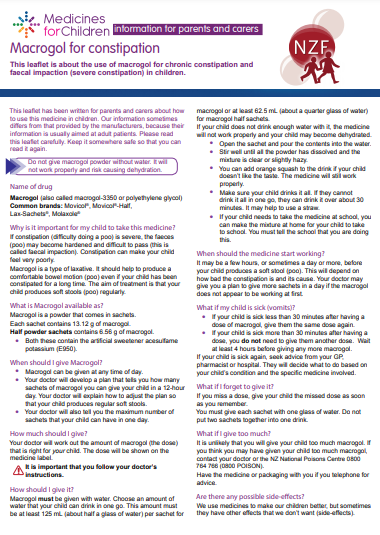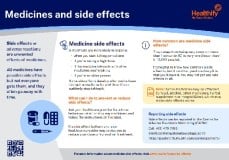You can now add Healthify as a preferred source on Google. Click here to see us when you search Google.
Macrogol
Sounds like 'mak-roe-gol'
Key points about macrogol
- Macrogol is a laxative used to treat and prevent constipation. It is also used to treat faecal impaction.
- Macrogol is also called Molaxole, Lax-Sachets or Movicol.
- Find out how to take it safely and possible side effects.

Macrogol is a type of laxative that helps to produce a soft bowel motion (poo). It's used to treat and prevent constipation in adults and children. Constipation (mate tūtae kore) is when your bowel motions (poo, stool or faeces) become hard and lumpy, making them painful or difficult to get out. It's also when you pass bowel motions less often than usual. Learn more about macrogol for constipation and constipation in adults.
Macrogol is also used to treat very severe constipation, called faecal impaction. This happens when the poo builds up in the bowel and becomes stuck. New poo will keep forming in the bowel but cannot get past the blockage, so it just builds up. Learn more about macrogol for faecal impaction.
There are many different types of laxatives. Macrogol is referred to as an osmotic laxative. It works by keeping water in the bowel, making your poo slightly bigger, softer and easier to pass. This stimulates the muscles of the walls of the bowel to contract and squeeze the poo along, causing a soft bowel motion. Read more about types of laxatives.
In Aotearoa New Zealand, macrogol for constipation comes as sachets of powder which need to be dissolved in water. Examples include Molaxole, Lax-Sachets and Movicol. For macrogol to work well, it’s important to drink plenty of liquids while taking it.
Macrogol is available with a prescription or it can be bought over the counter from a pharmacy or supermarket.
Note: The information on this page is about taking macrogol for constipation. Macrogol is also used along with other medicines in bowel cleansing preparations. These are used to remove poo from your bowel before a surgical procedure. Read more about bowel cleansing medicines.
For information on how to give macrogol to children, see macrogol for constipation information for parents and carers(external link).
The usual adult dose for constipation is 1 to 3 sachets daily. Macrogol can be taken at any time of day.
- Mix each sachet with 125 mL (about half a glass) of water. Macrogol must be dissolved in water.
- Do not put two sachets into one glass of water.
- Stir well until all the powder has dissolved and the mixture is clear or slightly hazy.
- If the dose required is half a sachet, make up a full sachet and only take half of the mixture.
- For a full sachet dose, make sure you drink all of the mixture. If you cannot drink it all in one go, then drink it over about 30 minutes. It may help to use a straw.
- You can add fruit juice or other flavour to the drink if you don’t like the taste – the medicine will still work properly.
- The powder should never be sprinkled straight onto food or tipped straight into milk, juice, squash, or anything else – it will not work properly if you do this. It’s important to dissolve the sachet in water first.
If you're unsure about how to use the sachets, ask your pharmacist for advice.
When should the medicine start working?
It may be a few hours, or sometimes a day or more before you have a bowel motion (poo). This will depend on how bad your constipation is and what's causing it. Talk to your healthcare provider if you're still constipated after 3 days. The number of sachets you're advised to take in a day may be increased by your healthcare provider if the macrogol doesn't appear to be working at first.
The usual adult dose for faecal impaction is 8 sachets daily, for up to 3 days. Macrogol can be given at any time of day.
- Dissolve the contents of 8 sachets in 1 L (litre) of water. Drink this over 6 hours.
- Once you have made up the sachets in water, cover and store in the fridge. Keep out of reach of children. Do not freeze.
- You can add fruit juice or other flavour to the drink if you don’t like the taste – the medicine will still work properly.
- Throw away any mixture not used within 6 hours.
Here are some things to know when you're taking macrogol. Other things may be important as well, so ask your healthcare provider what you should know about.
- Drink enough water: If you don't drink enough water with it, the medicine won't work properly and you may become dehydrated.
- Improve the taste: If you don't like the taste you can add fruit juice to the diluted macrogol just before drinking it – the medicine will still work properly. Using water that is slightly chilled may be helpful or try drinking the mixture through a straw.
- High-fibre diet: Increase the amount of fibre in your diet (more fruit, vegetables, brown bread and bran-based breakfast cereals) and increase physical activity to maintain healthy bowel function.
- Other medicines: Macrogol interacts with some medicines, herbal supplements and rongoā Māori, so check with your healthcare provider or pharmacist before starting macrogol and before starting any new products.
Like all medicines, macrogol can cause side effects, although not everyone gets them. If you're concerned about any symptoms talk to your healthcare provider. The following information offers some guidance but doesn't include all possible side effects.
Common side effects
Tell your healthcare provider if they bother you.
- Stomach discomfort, tummy ache, bloating (wind or gas).
- Diarrhoea (very runny poo).
Tell your healthcare provider immediately or phone Healthline free on 0800 611 116 if these occur
- Signs of dehydration such as feeling weak, very thirsty and headache.
Read more about medicines and side effects and reporting a reaction you think might be a side effect.
The following links have more information on macrogol.
Macrogol(external link) (adults) New Zealand Formulary Patient Information
Macrogol(external link) (children) New Zealand Formulary [PDF, 221 KB]
Brochures
Macrogol for constipation and disimpaction in children [PDF, 221 KB] Waitemata DHB, NZ
Constipation in children – macrogol for constipation(external link) NZ Formulary for Children, NZ, 2021
Medicines and side effects(external link) Healthify He Puna Waiora, NZ, 2024
5 questions to ask about your medications(external link) Health Quality and Safety Commission, NZ, 2019 English(external link), te reo Māori(external link)
References
- Macrogols (laxative)(external link) NZ Formulary
- Macrogols (laxative)(external link) NZ Formulary for Children
- Managing constipation in older adults(external link) BPAC, NZ, 2019
Are macrogol and Molaxole the same thing?
Yes, Molaxole is the brand name for the medicine that contains macrogol. Other brands available in New Zealand are Movicol and Lax-sachets.
How long does macrogol take to work?
Macrogol may take a few hours, or sometimes a day or longer, to help you have a bowel motion (poo). How quickly it works can depend on what's causing your constipation, and how severe it is. If you’re still constipated after 3 days, speak with your healthcare provider. They may adjust the dose or recommend additional treatments.
How does macrogol work?
Macrogol is referred to as an osmotic laxative. It works by keeping water in the bowel, making your poo slightly bigger, softer and easier to pass. This stimulates the muscles of the walls of the bowel to contract and squeeze the poo along, causing a soft bowel motion.
Brochures

NZ Formulary for Children, 2021

Medicines and side effects
Healthify He Puna Waiora, NZ, 2024

Health Quality and Safety Commission, NZ, 2019 English, te reo Māori
Credits: Sandra Ponen, Pharmacist, Healthify He Puna Waiora. Healthify is brought to you by Health Navigator Charitable Trust.
Reviewed by: Angela Lambie, Pharmacist, Auckland
Last reviewed:





